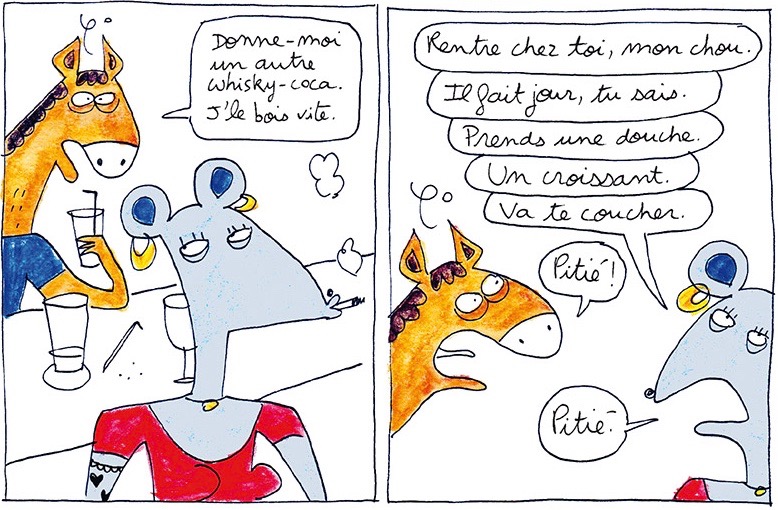Jean-Claude Carrière died yesterday, Monday, February 8, at the age of 89. Writer, author for theater, cinema and television, he leaves a work of incredible richness. Screenwriter, he has collaborated with the greatest directors. His complicity with Luis Buñuel lasted nineteen years. Those who met him defined him as an attentive and benevolent smuggler. In 2015 he published "Belief", in reaction to the attacks. Back on the journey of a talented man who liked to tellstories.
"The storyteller's work begins with the desire to tell"
Jean-Claude Carrière defined himself as a storyteller.
He was born in 1931 in a village in the Hérault, in a family of winegrowers. He spoke Occitan until the age of thirteen. At the age of fourteen, hisparents took over the management of a café in Montreuil-sous-Bois, in Seine-Saint-Denis. Jean-Claude Carrière continued his studies at the Lycée Voltaire, then at the Lycée Lakanal in Sceaux. He obtained a master's degree in literature and history at the École normale supérieure de Saint-Cloud. Later, he abandoned his career as a historian for drawing and writing, his true passions. He published his first novel, Lézard, in 1987. Then wrote novels of epo uvante at Editions Fleuve noir, under the pseudonym of Benoît Becker.
Encounter with cinema
His career as a screenwriter began in 1963 with the film Le Soupirant by Pierre Etaix. In 1964, he began a collaboration with Luis Buñuel that lasted nineteen years, until the death of the director. The two menadapted together Octave Mirbeau's novel Le Journal d'une femme de chambre, with Jeanne Moreau. Then worked together on five other films, including two of the director's most famous: Belle de jour and Le Charme discret de la bourgeoisie. This surrealist satire earned them an Oscar nomination for Best Original Screenplay in 1989. In 1983, The Return of Martin Guerre (directed by Daniel Vigne) earned him the César for best screenplay. Jean-Claude Carrière also collaborated with Czech-born director Miloš Forman, co-wrote the screenplay for two of Jacques Deray's most famous films, La Piscine in 1969 and Borsalino in 1970.
Fifty-seven years of writing
From 1963 to 2020, he wrote more than sixty scripts for the cinéma and collaborated with the greatest: Jacques Tati, Louis Malle, Alain Corneau, Patrice Chéreau, Jean-Luc Godard, Jean-Paul Rappenandthe… His latest screenplay for the cinema is Le Sel des larmes by Philippe Garrel, in 2020.
At the same time, he pursued his career in theatre, in particular with André Barsacq, Jean-Louis Barrault and Peter Brook. He adapted fourteen plays and wrote twelve. His last play as an author was L'aide mémoire, in 2014, directed by Ladislas Chollat at the Théâtre de l'Atelier. He also acted in a few films. And won numerous awards including the César for Best Original Screenplay in 1983, the Jean-Le-Duc Prize for his entire work as a cinematographic author in 1988. In2005, he even received an honorary Oscar.
"Writing a screenplay is much more than writing"
In 1990, Jean-Claude Carrière co-authored Exercice du scenario, a book dedicated to writing for the cinema. And gives his vision on this particular form of writing: " Writing a screenplay is much more than writing, it is writingdifferently; with glances and silences, with movements and stillnesses". In a scenario, rhythm is essential and must be inspired by the rhythm of life. Jean-Claude Carrière defines the screenwriter as a mobile and curious individual, who "collects the departures of history, which he has found in reality". And tells an anecdote about the film Taking Off by Milos Forman. In one scene, a drunk character tries to eat a hard-boiled egg at the counter of a café. This situation is inspired by a scene he attended, twenty years earlier, in a café in Montreuil-sous-Bois. He had kept in mind every gesture.
A transitional state
"The scenario is a transitory state, a transient form destined to metamorphose and disappear, as the caterpillar becomes a butterfly." The script is not the final work, but the material used to make a film. At the moment when the film is made, something escapes the screenwriter that he was until then the only one to possess. Thescript is dissected, analyzed, sometimes even reworked, with or without him. In Exercice du scenario, Jean-Claude Carrière confides that this can leave a certain bitterness.
Writing a screenplay also requires compliance with certain constraints. Et Jean-Claude Carrière questions the possible art of personal expression in the writing of a "commercial object". To conclude that the screenwriter, even if he writes for others, is always present, always sensitive, in everything he does. And that there is always an element of subjectivity, even in the case of adaptations. Because the screenwriter, in the way he constructs his story, necessarily brings an angle, a look.
Cinema: a mysterious inner theatre
Jean-Claude Carrière called the imagination the "master faculty of the mind". And has always maintained that it was possible to train him, so as not to give in to the temptation of laziness. Because the human brain is simplifying, with an unfortunate tendency to favor easy and definitive solutions. However, writing requires waking up your brain, and contradicting it. To develop a faculty to imagine twists and multiple tracks. The famous "What if?". What if my character took path B instead of A? Write, then rewrite and rewrite again. The scenario is an object in constant transformation and evolution. "A film is anything but a conclusion," he said. "All that remains as the only judge, when we write for the cinema, is this mysterious inner theatre, the darkest of rooms, which we each possess in ourselves, and where, in a still hesitant and imperfect way, the first screening of the film we are imagining takes place".
Do you like French cinema? Discover the article on Francis Veber.







































